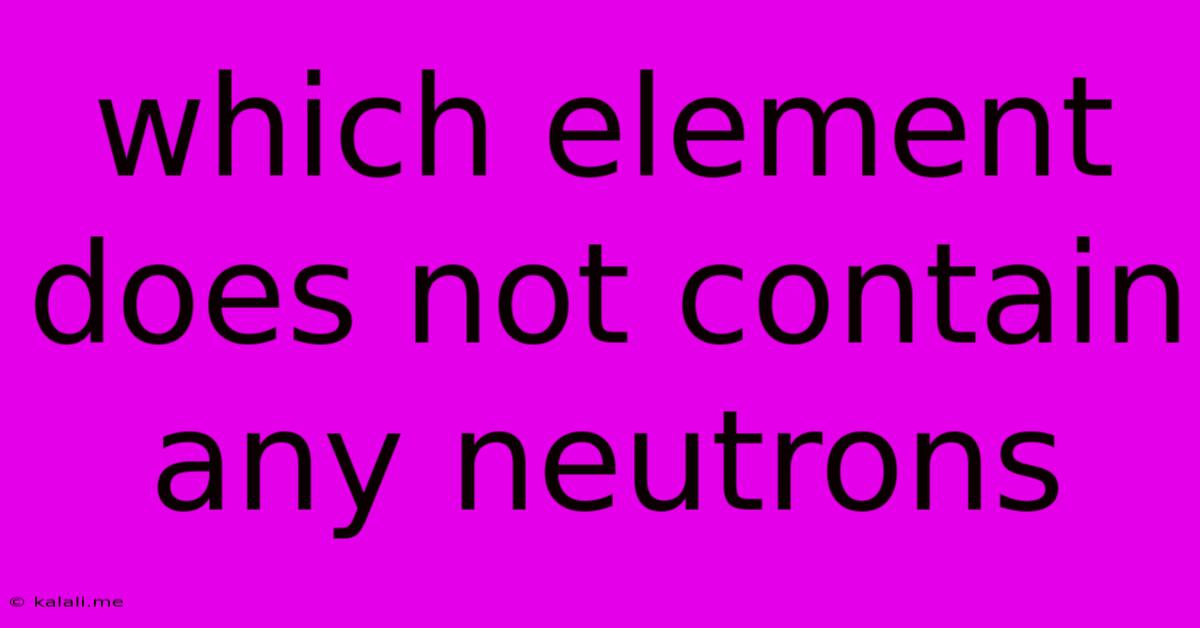Which Element Does Not Contain Any Neutrons
Kalali
Jun 13, 2025 · 2 min read

Table of Contents
Which Element Contains No Neutrons? Unlocking the Secrets of Hydrogen Isotopes
The question, "Which element contains no neutrons?" might seem deceptively simple, but understanding the answer requires a dive into the fascinating world of atomic structure and isotopes. The short answer is hydrogen, specifically its most common isotope, protium. This article will explore why, delving into the concepts of protons, neutrons, isotopes, and the unique properties of hydrogen.
The atom, the fundamental building block of matter, consists of three primary subatomic particles: protons, neutrons, and electrons. Protons carry a positive charge, neutrons are electrically neutral, and electrons carry a negative charge. The number of protons in an atom's nucleus determines its atomic number and identifies the element. For instance, an atom with one proton is hydrogen, two protons is helium, and so on. The number of neutrons, however, can vary for a given element, leading to the existence of isotopes.
Isotopes are atoms of the same element with the same number of protons but a different number of neutrons. This difference in neutron count affects the atom's mass but not its chemical properties. Hydrogen, the lightest element on the periodic table, has three naturally occurring isotopes:
-
Protium (¹H): This is the most common isotope of hydrogen, comprising about 99.98% of all naturally occurring hydrogen. It contains one proton and no neutrons.
-
Deuterium (²H or D): Deuterium contains one proton and one neutron. It's a stable isotope, meaning it doesn't readily decay.
-
Tritium (³H or T): Tritium contains one proton and two neutrons. It's a radioactive isotope, meaning it undergoes radioactive decay.
Therefore, while hydrogen atoms generally have one proton and one electron, the absence of a neutron in protium makes it the only element with an isotope containing no neutrons. This lack of a neutron significantly affects protium's properties, contributing to its lightness and its unique role in various chemical and physical processes. Understanding isotopes is crucial in many fields, including nuclear physics, chemistry, and medicine.
Understanding the different isotopes of hydrogen is vital for comprehending various scientific phenomena and applications. The unique properties of each isotope contribute to its distinct role in nuclear reactions, isotopic labeling techniques, and even in advanced medical imaging procedures. Deuterium, for example, is used in nuclear magnetic resonance (NMR) spectroscopy, while tritium finds application in certain types of self-powered lighting devices.
In conclusion, the element that doesn't contain any neutrons is hydrogen, specifically its most abundant isotope, protium. The existence of isotopes highlights the complexity and diversity within the seemingly simple structure of atoms, revealing a fascinating world of subtle differences with significant consequences. Further exploration into the properties and applications of hydrogen isotopes will undoubtedly continue to yield exciting discoveries in various scientific disciplines.
Latest Posts
Latest Posts
-
Common Factors For 84 And 105
Jun 14, 2025
-
Which Color Is Not A Primary Color
Jun 14, 2025
-
What Is The Difference Between A Square And Rhombus
Jun 14, 2025
-
The Normal Rbc Graveyard Is The Liver
Jun 14, 2025
-
Can You Reschedule A Sat Test
Jun 14, 2025
Related Post
Thank you for visiting our website which covers about Which Element Does Not Contain Any Neutrons . We hope the information provided has been useful to you. Feel free to contact us if you have any questions or need further assistance. See you next time and don't miss to bookmark.